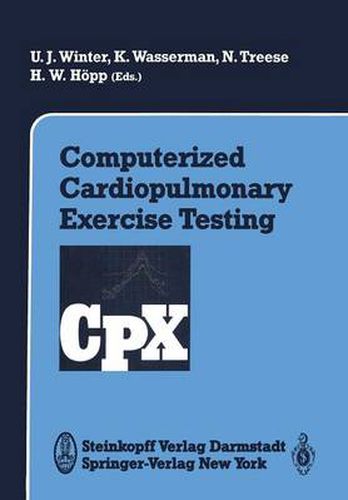Readings Newsletter
Become a Readings Member to make your shopping experience even easier.
Sign in or sign up for free!
You’re not far away from qualifying for FREE standard shipping within Australia
You’ve qualified for FREE standard shipping within Australia
The cart is loading…






This title is printed to order. This book may have been self-published. If so, we cannot guarantee the quality of the content. In the main most books will have gone through the editing process however some may not. We therefore suggest that you be aware of this before ordering this book. If in doubt check either the author or publisher’s details as we are unable to accept any returns unless they are faulty. Please contact us if you have any questions.
The measurement of cardio-circulatory and gas-exchange parameters during phy sical exercise - the so-called ergo spirometry or cardiopulmonary exercise testing (CPX) - as a basis of pathophysiological and clinical research has a long tradition in Cologne. Knipping and his coworkers, especially Hollmann, performed basic re search work in healthy subjects. In the area of sports medicine, bicycle or treadmill exercise testing with parallel serial lactate determinations has gained increasing im portance for the assessment of cardiac functional capacity. Also, in other medical disciplines, ergospirometry lost its importance. K. Wasserman in Los Angeles is to be credited for having further improved the method to its present standard, a computerized, on-line measuring and practicable cardiopulmonary exercise testing procedure. The prerequisites were technical innovations, such as continuously measuring gas analyzers and personal computers. Thereby, the knowledge about physiology, pathophysiology, and clinical circumstances of cardiocirculatory and re spiratory regulation during exercise were significantly extended. The working groups of W. Hollmann, Cologne, and K. Wasserman, Los Angeles, determined normal values for the gas-exchange parameters and derived values for healthy normals in large populations. Wasserman and coworkers were able to introduce a differential diagnostic concept for patients suffering from various cardiovascular and cardio pulmonary diseases. Many cardiologists, working, for example in myocardial failure or with rate-adaptive pacemakers, belong to those who recommended the modem, computerized ergo spirometry. Furthermore, this method is controversely discussed* by colleagues working in sports medicine and pulmonary function.
$9.00 standard shipping within Australia
FREE standard shipping within Australia for orders over $100.00
Express & International shipping calculated at checkout
This title is printed to order. This book may have been self-published. If so, we cannot guarantee the quality of the content. In the main most books will have gone through the editing process however some may not. We therefore suggest that you be aware of this before ordering this book. If in doubt check either the author or publisher’s details as we are unable to accept any returns unless they are faulty. Please contact us if you have any questions.
The measurement of cardio-circulatory and gas-exchange parameters during phy sical exercise - the so-called ergo spirometry or cardiopulmonary exercise testing (CPX) - as a basis of pathophysiological and clinical research has a long tradition in Cologne. Knipping and his coworkers, especially Hollmann, performed basic re search work in healthy subjects. In the area of sports medicine, bicycle or treadmill exercise testing with parallel serial lactate determinations has gained increasing im portance for the assessment of cardiac functional capacity. Also, in other medical disciplines, ergospirometry lost its importance. K. Wasserman in Los Angeles is to be credited for having further improved the method to its present standard, a computerized, on-line measuring and practicable cardiopulmonary exercise testing procedure. The prerequisites were technical innovations, such as continuously measuring gas analyzers and personal computers. Thereby, the knowledge about physiology, pathophysiology, and clinical circumstances of cardiocirculatory and re spiratory regulation during exercise were significantly extended. The working groups of W. Hollmann, Cologne, and K. Wasserman, Los Angeles, determined normal values for the gas-exchange parameters and derived values for healthy normals in large populations. Wasserman and coworkers were able to introduce a differential diagnostic concept for patients suffering from various cardiovascular and cardio pulmonary diseases. Many cardiologists, working, for example in myocardial failure or with rate-adaptive pacemakers, belong to those who recommended the modem, computerized ergo spirometry. Furthermore, this method is controversely discussed* by colleagues working in sports medicine and pulmonary function.